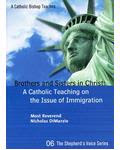 Immigration is quickly becoming a contentious issue both within the halls of Congress and the walls of churches. How can a Catholic respond compassionately to immigrants? How do we balance the dignity of strangers with economic prudence and national interest? Bishop Nicholas DiMarzio—head of the Diocese of Brooklyn—clearly presents Catholic social teaching on immigration in “Brother and Sisters In Christ” (Basilica Press, 39 pages, paperback).
Immigration is quickly becoming a contentious issue both within the halls of Congress and the walls of churches. How can a Catholic respond compassionately to immigrants? How do we balance the dignity of strangers with economic prudence and national interest? Bishop Nicholas DiMarzio—head of the Diocese of Brooklyn—clearly presents Catholic social teaching on immigration in “Brother and Sisters In Christ” (Basilica Press, 39 pages, paperback).
Written in question-and-answer format, the booklet is a short, easy primer on the Catholic view of immigration that can be read in a single sitting. “Brother and Sisters In Christ” stresses dignity as the guide to addressing the issues of immigration. All questions, all proposed policies, and all argument should be guided by the promotion of dignity. Early on, DiMarzio states that “each Catholic must judge themselves on the issue of how well their immigration position upholds human dignity and human life.”
Beginning there, DiMarzio approaches questions, critiques, and frequently asked questions surrounding the immigration debate. He explores immigration’s effects on society, religion, and culture, poking into difficult subjects like taxes, national security, the labor-force, and social services. On one central issue, the handling of current illegal immigrants, DiMarzio lays out the Bishop’s middle-of-the-road approach. First, he bluntly states that illegal immigration is not condoned by the Church. However, he qualifies that by noting that laws must be just. According to DiMarzio, while recognizing that the law has been broken, “the U.S. bishops…favor allowing undocumented immigrants to earn the right to remain through their hard work, their good character and learning English.”
In essence, the Bishops don’t advocate mass deportation, nor do they promote unfettered amnesty. As in all things, they take a more prudent, compassionate approach with the dignity of both Americans and illegal immigrants guiding there words.
In responding to each of the booklet’s questions, DiMarzio doesn’t offer precise answers, but instead broad Catholic principles to frame the immigration conversation. Dignity, prudence, and solidarity are offered as guiding principles, absolutes in this abstract debate.
